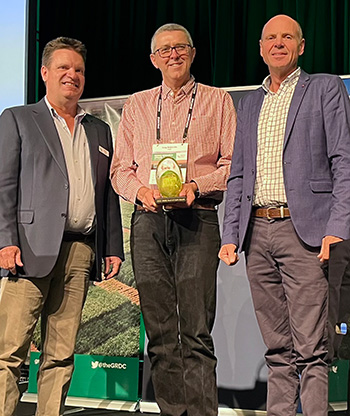One of Australia’s leading research geneticists in wheat breeding, Dr Greg Rebetzke, is this year’s recipient of the GRDC 2023 western region Seed of Light Award.
The highly coveted annual award recognises outstanding communication of GRDC supported research outcomes. Dr Rebetzke was presented with the award at the GRDC Grains Research Update in Perth this morning.
GRDC western region panel chair Darrin Lee says that through the award, GRDC recognised those whose passion and commitment drives the success of the Australian grains industry.

GRDC Western Panel Chair Darrin Lee, Seed of Light award winner Dr Greg Rebetzke and GRDC Chair John Woods. Photo: GRDC
“Greg is an excellent communicator, helping growers understand the benefits in novel and new genetics, most recently long coleoptile, short season and high vigour varietal traits,” Mr Lee says.
“He communicates in a way that builds trust with growers, inspiring them to take up new technologies and approaches in their farming systems.
“Greg has dedicated time to communicating his wheat genetic research across regions, which has led to important incremental change to yield and profit for Australian grain growers.
“His impact in Western Australia has been immense, and we recognise Greg today for his outstanding contribution by awarding him the GRDC Seed of Light award.”
Originally from Brisbane, Dr Rebetzke credits his undergraduate degree at Queensland Agricultural College with instilling in him an appreciation for practical and applied knowledge.
He refined his research skills through a Masters in Agricultural Science at the University of Queensland, before completing a PhD in Breeding and Genetics at North Carolina State University in the United States.
Dr Rebetzke has worked with Australia’s national science agency CSIRO since 1995 and became a chief research scientist at CSIRO Agriculture and Food in 2017. He is also an adjunct professor at Charles Sturt University, Wagga Wagga and the University of Western Australia, Perth.
In receiving the award, Dr Rebetzke says the opportunity to talk to growers about GRDC investments over the years had been instrumental in leading to scientific breakthroughs in wheat genetics.
“In my experience, grain growers are incredibly observant and insightful; they lead you along a path of discovery,” Dr Rebetzke says.
“Making observations and questioning what those observations mean - that’s where the real breakthroughs are.
Dr Rebetzke describes stepping away from the lab and glasshouse and moving almost entirely into the field, working closely with growers on their farms, as a milestone moment in his career.
“It really just changed the way I see and understand the challenges with farming in a rain-driven cropping system,” Dr Rebetzke says.
“It often meant driving long distances away from home and family, but the return on investment in talking to growers and researchers in regional areas has truly opened my mind.
“It’s growers that have inspired me to get out and listen, talk and learn. Sitting in an office doesn’t give you the insight into what growers need and doesn’t allow you to tap directly into grower’s knowledge.”
A former member of the GRDC western region panel, Dr Rebetzke regularly contributes to a number of national and international grower and scientific advisory committees, and is currently editor of the Journal of Experimental Botany and The Plant Cell.
He credits a number of key grain industry leaders and researchers in contributing to his success, including New South Wales Department of Primary Industries researcher the late Neil Fettell, as well as former and current GRDC western panel chairs Peter Roberts and Darrin Lee.
“Neil inspired me with his passion for the grains industry. He really focused on the importance of science and science engaging closely with growers, he was quite exceptional,” Dr Rebetzke says.
“Peter and Darrin – their leadership and support of impactful science for the grains industry, particularly in WA – is exceptional.
“I’m also very grateful to CSIRO and colleagues for their continued support in my research over the past 30 years.
“The Seed of Light award is a reflection of the grains industry and how invested it is in engagement, in delivering the science, particularly around profitability.
“If you didn’t have an industry that was so keen to learn and deliver the best, then you wouldn’t get the best out of scientists.”

























































